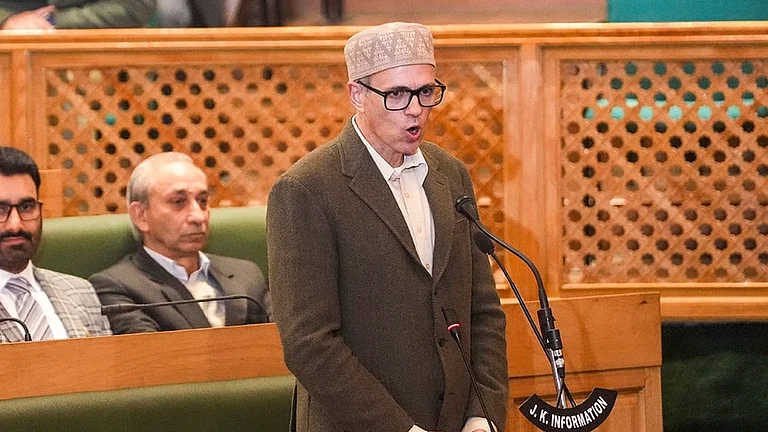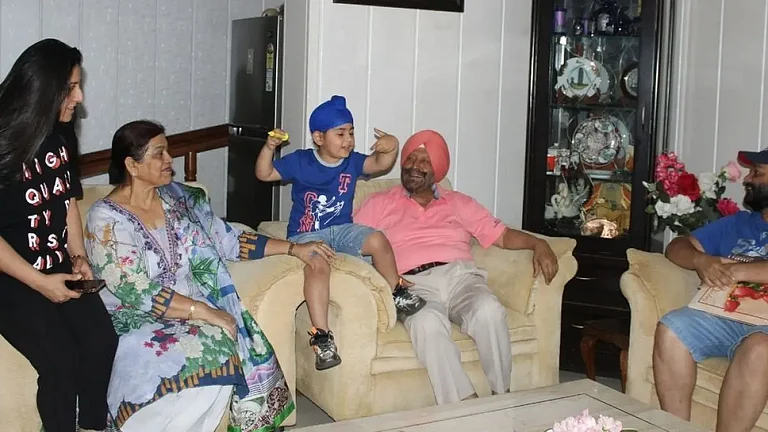Upon his return from the Middle East trip in July 1944, Maharaja Hari Singh was taken through Srinagar in a welcome procession where Sheikh Abdullah presented him with a copy of the ‘Naya Kashmir’ manifesto as the procession passed by the Mujahid Manzil.
The manifesto was not simply a collection of slogans and demands but a substantial 44 page document that contained a proposed constitution for Jammu and Kashmir and a detailed economic plan.The mind behind this revolutionary document was Baba Pyare Lal Bedi (BPL Bedi), a leftist intellectual from Punjab and close friend of Sheikh Abdullah. Freda, the sharp-minded wife of Bedi would type the manuscript herself. When the manifesto was written out it was hailed as a pathbreaking document both in the state and the country as a whole.
In October 1947, when Sheikh Abdullah came to power in Kashmir valley, ‘Naya Kashmir’ was the name by which his project of modernising the former princely state became known. Some of its main provisions like the agrarian land reforms were successfully acted upon. It set apart the National Conference as a progressive force in the subcontinent and distinguished it from its politically and socially more conservative rival, the Muslim Conference. The main goals of the Naya Kashmir manifesto were ‘the organisation of agriculture on a more modern and rational footing and the provision for the peasant of a higher standard of living’ The basic principles were to be the ‘abolition of landlordism’, the provision of the ‘land to the tiller’ and cooperative association in the production and sale of crops. In its peasant charter it declared that ‘ All land which at present belongs to the landlords will revert to the peasant and the peasants would be made ‘completely debt free’.
In his preface to the Naya Kashmir manifesto, Sheikh Abdullah emphasized that:
‘We intend to give a modern orientation to our men and women in New Kashmir. They have been dwarfed spiritually and intellectually by centuries-long torment and persecution. We are hopeful to create individuals who will do our charming land proud’
On August 19, 2024, the National Conference unveiled its election manifesto for the upcoming assembly elections in the Union Territory of Jammu and Kashmir. Addressing the media at Srinagar's Radisson Hotel, Omar Abdullah, the party’s vice president and grandson of Sheikh Abdullah, outlined the party's key pledges to the people of Jammu and Kashmir as detailed in the manifesto. Some of the promises include:
Restoration of 370-35A, and statehood as prior to August 5 2019
Repeal of the Public Safety Act (PSA)
Provide one lakh jobs to the youth.
Provide 200 units of electricity free.
Provide Rs 5000 per month to female heads of households to EWS
End Passport Verification.
End to Unjust Terminations.
Establish Village and Mohala Clinics for basic healthcare and emergency care.
The last elections in Jammu and Kashmir took place in 2014, when it was still a full-fledged state with the protections of Articles 370 and 35A. Now, a decade later, as elections approach once more, Jammu and Kashmir has been reduced to a Union Territory without these constitutional safeguards. On August 5, 2019, Article 370 was revoked, and the state's status was downgraded. The progress achieved through Sheikh Abdullah’s implementation of the 'Naya Kashmir' manifesto in 1947 was effectively undone in 2019. Today, Kashmir finds itself at a pivotal moment, much like it was during Maharaja Hari Singh’s reign. The National Conference's current manifesto, beyond offering promises of employment for the youth, robust welfare schemes, and various development measures, also vows to reverse the changes made on August 5, 2019.
The question though remains that in an assembly with limited powers, where the Lieutenant Governor holds more authority than the Chief Minister in many matters, how will the National Conference realistically fulfill the promises outlined in its manifesto? Earlier this year, in a statement to the Indian Express, Omar Abdullah firmly declined to participate in the assembly elections, stating, "I can’t see myself in a position where I have to ask the L-G to pick my peon... waiting outside for him to sign the file." With such an imbalance of power between the Chief Minister and the Lieutenant Governor, how does the National Conference plan to provide 100,000 jobs to the youth of Jammu and Kashmir?
The Naya Kashmir manifesto of 1947 was a revolutionary document that ushered in an era of prosperity for the people of Jammu and Kashmir. The agrarian reforms that it entailed were protected under article 370 which had over the years resulted in the emergence of a successful middle class in the state. With no special status and no constitutional guarantees, the process that was started in 1947 was undone permanently in 2019. The current manifesto of the National Conference, though ambitious in its promises, faces an uphill task where power is largely centralised with the Lieutenant Governor. Whether these promises would be as consequential as were the ones listed in the Naya Kashmir manifesto would depend on how effectively the National Conference navigates the new terrain on which Jammu and Kashmir has been put in 2019.



























